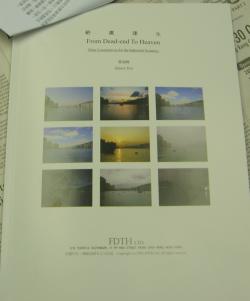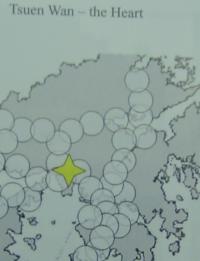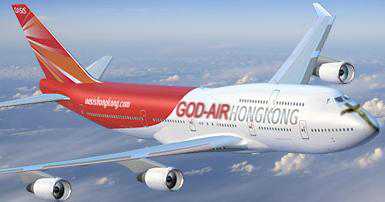
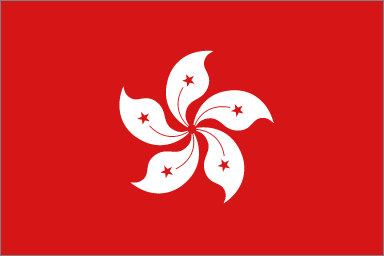
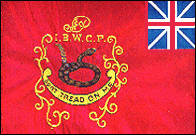
Random events are not distributed evenly but tend to occur in clusters, which is why there is no need for the public scares that happen when an airline reports a sudden series of inflight engine shutdowns or several children in the same small town are found to have leukaemia. To take another example, let’s say there’s a densely populated city where the Transport Department is run by psychopaths, there is no traffic management and little enforcement of traffic laws, and no-one thinks it odd that you can drive a six-wheel, 10-ton Hino truck into a dead-end street 12 feet wide. From time to time, people will be knocked down and killed, because it is impossible to manoeuvre such a vehicle safely in such a small space with pedestrians around. And these deaths will not occur at neat, regular intervals but in groups, a few one month and none the next.
The recent spate of people being crushed by trucks in Hong Kong has for some reason triggered a minor outcry. My initial reaction was that the place is getting soft – the stoicism and self-reliance of the old days is giving way to mawkish sentimentality. As is always the case, the victims were elderly, young, unskilled or similarly of limited economic productive capacity. No movie stars, civil servants, rich people or expensively groomed dogs were mangled up. On closer inspection, however, I think I can see why this latest series of accidents has caused alarm among the chattering classes. A couple of the deaths took place in the northwestern part of Hong Kong Island. Middle class people with some faint, theoretical chance of having their voices heard by officials, would have been riding the Mid-Levels Escalator reading the newspaper and realize that their own children use the cul-de-sac where a kid was killed, and they would have thought, “Oh my God, that could have been Muffy.”
The Transport Advisory Committee comes to the rescue…
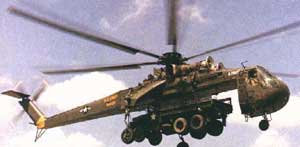
First, a few weeks ago, Nobel prize winner Milton Friedman slapped Chief Executive Donald Tsang in the face for his remarks that the Big Lychee no longer practices positive non-interventionism. And now this year’s laureate, Edmund Phelps, joins in – albeit after an invitation and probably some loaded questioning from headline-hungry reporters from The Standard and Sing Tao. If Sir Bow-Tie were really, as he fondly imagines, a politician, his response would be to spit on the ground and say, “We don’t need no stinkin’ Nobel prize winners.”
For all their accomplishments, neither Friedman nor Phelps knows much about Hong Kong. Friedman lauded us for apparently following his favoured laissez-faire policies. But as Leo Goodstadt argues in his book Uneasy Partners, colonial officials used laissez-faire to win the loyalty of the business community (by keeping taxes and social spending low), while preventing the tycoons from plundering and destabilizing the place (by resisting their calls for handouts and protection). The growing intervention in housing and other social areas was similarly based on a need to maintain the rulers’ grip on a restive colony.
Today, Hong Kong is stuck with an outdated political structure dominated by the interests of the civil service and the property and other cartels, who skim wealth off the rest of the economy. Other groups, notably functional constituencies in the legislature, demand their share too, so we have incessant handouts for such parasites as the construction and tourism sectors. Unrepresented and jealous sections of the community are fobbed off with subsidized services and promises of minimum wages. Professor Phelps’s warning that Hong Kong will slide into corporatism is absurd. We’re there already. Will we proceed into Singapore-style economic management? Probably not. After decades in the civil service, it must be hard-wired into Sir Bow-Tie that Thou shalt not allocate savings to favoured industries, just as much as Thou shalt not stop building roads and bridges everywhere.
So, who cares what some gwailo economist on the other side of the world thinks? Answer – the Hong Kong Government. Everyone knows that the only important thing in the world is credentials. Like having the Heritage Foundation declare you Freest Economy in the Solar System every year. Nobel Prize laureates are the pinnacle of human existence. We even offer them, along with Olympic medalists, free, automatic right of residency in our Desperately Seeking Quality Or At Least Important-Sounding Migrants Scheme. And they treat us like this.
The mood among the young teenagers on the Mid-Levels Escalator this morning is excitable verging on hyperactive. For years, our children have been miserable and pathetic creatures who need small but hardy Filipino ladies to carry their books for them as they sleepwalk to school. But no longer. All of a sudden, they are starting the day bright-eyed, alert and bouncing off the classroom ceilings, thanks to their new, high-energy diet.
It’s the famous Krispy Kreme Special Post-Breakfast Snack deal, available at the venerable bakery’s Soho branch. For just HK$198, you get four cups of coffee, a dozen original doughnuts and a dozen assorted ones – each hand-crafted from pure refined flour, yeast and water, deep-fried to obtain the renowned crusty exterior, then lovingly coated in generous quantities of liquid sugar. They are hot cakes, and selling accordingly.
It is good to see Krispy Kreme doing so well here after the sad decline of its empire in North America in recent years. Part of the problem there was simple, greed-driven over-expansion, as the company signed up too many franchisees. Not everyone can eat 24 a day. Another snag was the cheapening of the brand by smaller outlets selling inferior product cooked offsite. And then came the allegations about manipulated sales figures. But the main cause of the firm’s downfall seems to have been the disturbing trend among a small but growing number of Americans not to stuff their faces full of enormous quantities of sugary, trans fat-laden carbohydrates at every opportunity. Now the youth of Hong Kong come to the corporate rescue.

At some point we will stop handing over parts of Hong Kong to tourists and say, “We’re keeping this bit for ourselves, the residents.” It might be a popular neighbourhood noodle shop being shut down to make way for another skin-whitening outlet aimed at Mainland women. It might be a plot of land that would make a beautiful park but will become yet another shopping mall full of designer label goods locals don’t want or know where to get more cheaply. It might be a chunk of the old Kai Tak runway that market forces would put to profitable use, but the Government decrees will be a cruise ship terminal.
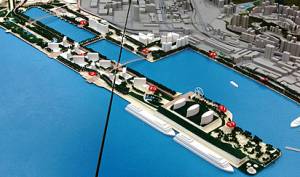
Are our civil servants evil or just stupid? Are they dedicating acres of waterfront to this specific industry as a favour to someone or in return for a little something? Or do they genuinely imagine, in their usual reverie of bureaucratic infallibility, that this is a good use of resources and that they are being clever?
We are told…
So are the bureaucrats mad or bad? Are they congenitally economically illiterate through no fault of their own, or scheming crooks who think the rest of us can’t add up? I will call one up sometime, ask her out to some quiet corner of town that still hasn’t been pimped out to the tourism trade, and ask.
A proud moment in Hong Kong’s aviation history didn’t happen yesterday, as Oasis Airlines failed to take off on its first flight after Russian authorities mysteriously denied it permission to cross their territory. Since countries charge airlines for using their air traffic control facilities and precious patch of sky, it could be that there was a misunderstanding about money. Being a cheap carrier, Oasis was using an unpopular midday slot to depart Chek Lap Kok for London Gatwick, so there shouldn’t have been a problem with congestion on the Asia-Europe routes.
People with nasty suspicious minds might imagine that the Big Lychee’s dominant Cathay Pacific – part-owned by the venerable and ancient Swire – has a hand in this. They are sufficiently friendly with people in Moscow to have a code-sharing arrangement with Aeroflot and have long been on good enough terms to sort out Russian overflight rights with little fuss. My old friend at Swire, Percy Ratbone, recalls a trip to see Muscovite aviation officials, followed by a night on the post-Soviet town. At one drinking establishment, he was approached by a very buxom, big-haired blonde women, who huskily asked, “Do you vant… see-yex?” This has been a big joke ever since among his colleagues, to whom the airline is ‘CX’.
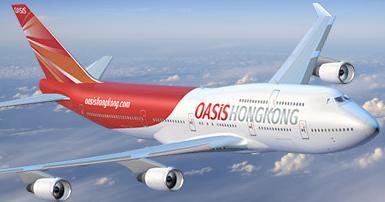
However, a handful of flights a week to Gatwick doesn’t seem like much of a threat to Cathay. And although Hong Kong people are blissfully unaware of the exploitative power of producer interests in many industries, they do like a good deal on a flight, and the Government cannot afford to take a blatantly anti-consumer stance here. So the black hand of Cathay is probably not at work. The economics of long-haul ‘budget’ airlines being debatable, at best, the Swire boys are no doubt assuming that Oasis will collapse before long. As a shareholder myself, I am inclined to agree.
So what is the cause of Oasis’s woes? It could be that someone very highly placed indeed doesn’t like the airline’s Chairman and CE, the Rev Dr Raymond C Lee. If I were the Almighty, I would find Bible-bashers who were also property developers strangely irksome and possibly unfit for residence in the Kingdom of Heaven – at least not without some difficulty. Like a last-minute snag from Russia. How will they be able to attract passengers when everyone knows that God hates this nasty little airline?
Who is Henry Tso, Chairman and CEO of FDTH Ltd, a company based in Wong Chuk Hang? He is circulating a proposal around the great and good of Hong Kong – and that is all the Big Boss can tell me, as he tosses the glossy booklet over to me at the morning meeting.
Back in the gwailo’s lair, I take a closer look at From Dead-end to Heaven – Three Locomotives for the Industrial Economy. According to the covering letter, Tso has hit on a way for Hong Kong to “revitalize the industrial economy to bring back full employment,” and thus avoid the need for a goods and services tax.
It sounds like it’s going to be yet another self-serving request for free land from some slimy Liberal Party nematode promising to create jobs by bringing the factories back across the border. But no! It turns out to be the most grandiose and crazed vision of a leisure infrastructure makeover since Coleridge’s Xanadu.
Who was the only person to call on the great poet during the several days he spent in a remote moorland farmhouse writing the opium-induced dream of Kubla Khan’s stately pleasure dome? This is a question that stubbornly refuses to be asked at any trivia quiz I attend, much to my annoyance. The answer is – an insurance salesman.
Henry Tso does not seem to been disturbed by anyone in developing his fantasy of the three locomotives that will serve as a “pro-active non-intervention market enabler” to rescue our low-tech small and medium enterprises and bring the Government a HK$300 billion windfall from the sale of massively revalued land.
The plan is to keep the average Mainland tourist in Hong Kong for four nights longer than the current average stay – and getting the grubby hordes out of Central and Causeway Bay (he deserves a Gold Bauhinia Star for that miracle alone). This will be accomplished by improving transport links between every conceivable existing tourist attraction in town – waterfalls, beaches, medicine shops, temples, markets, museums – and adding new ones. This is where the hallucinations really start. He sees a Hall of Kiss Our Environment, a Titanic look-alike ship, a Ting Kau Under-Boardwalk Express, a Yellow Submarine Tour and a re-creation of Cheng Ho’s fleet, which would sail the world in the off-season as an ambassador of Hong Kong. Each attraction will be no more than 15 minutes from another. The hub of this whole wonderland will be… Tsuen Wan.
One molecule of this booklet contains more imagination, flair and genius than the entire headquarters of the Hong Kong Tourism Board.
What is he on? Where can I get some?
